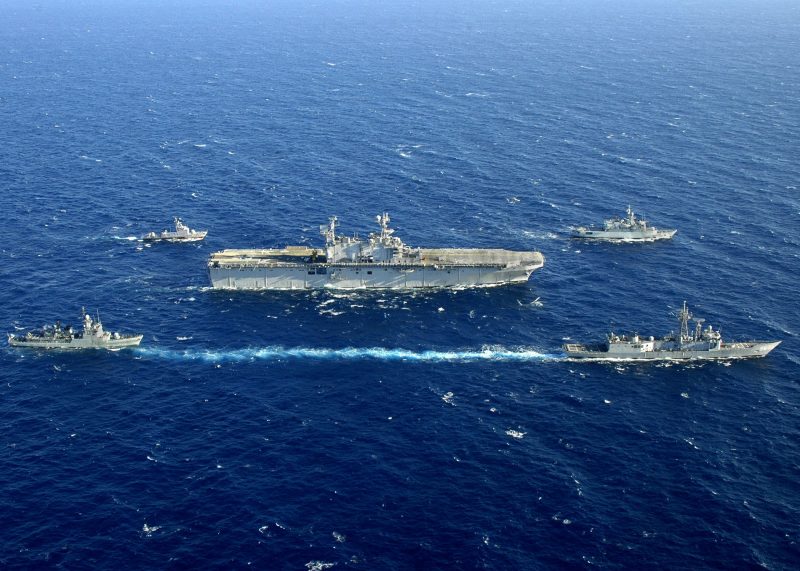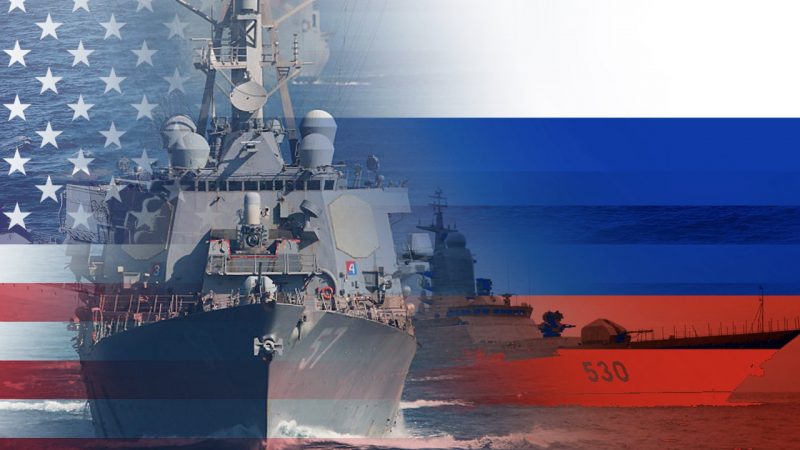The 5th Fleet, which Soviet Russia first established in the Mediterranean in 1963-64, is now challenging the 6th Fleet of the US in the waters of the Mediterranean.
The pessimistic attitudes towards Turkish-Russian friendship in Syria, Libya and the Eastern Mediterranean today are based on the idea that Russia is moving toward warm waters.
In fact, the issue of navigating to ‘warm waters’ is based on the search for ‘warm water ports’ that Russia started in the 18th century. Russia, which was geographically stuck between the glacier-covered seas in the north and the Ottoman Empire with the straits and the Black Sea in the south, was a country that had no access to warm waters. Due to the freezing of the Russian ports in the Baltic and Vladivostok in winter, maritime trade could not develop and the necessary naval strength to become a global power could not be established. The main axis of the struggle not only with the Ottomans but also with Britain through Sweden and Germany in the west, Japan in the east, Pakistan, India and Iran in the south for about 300 years was based on this search.[1]
However, for Russia, this big problem was solved step by step as a result of the establishment of the ‘thin navy’, then the domination of the Black Sea with the Crimean War of 1856 and the melting of the glaciers year after year by the ships with nuclear marine propulsion. Today, Russia has the opportunity and capability to display flags in every water of the world, thanks to 18 nuclear icebreakers and warships powered by nuclear propulsion. Admiral Kuznetsov aircraft carrier and the ‘stealth’ aircraft that they will deploy on it soon constitute the biggest power factor of this force. Currently, Russia has over 100 ships operating in the world’s oceans. [2]

RUSSIA SETTLED IN THE MEDITERRANEAN A LONG TIME AGO
The descent into the Mediterranean of the modern navy of the Russians has a 70-year history. The Soviet Fleet, which went to the region with the US landing in Lebanon in 1958, was formed as the ‘Mediterranean Power’ in 1963-64. The Mediterranean Squadron, which had a complex structure where various ships from the Black Sea and Baltic Fleet landed sequentially in the Mediterranean Sea, was transformed into an independent power after the Six-Day War in 1967. In accordance with the Politburo’s decision of June 1967, Admiral Boris Petrov assumed command of all forces in the Mediterranean on July 14, 1967. Thus, the Soviets, who started looking for a base in the Mediterranean, signed an agreement with Syria in 1971 and settled in the Port of Tartus.
Subsequently, naval bases were established in Egypt, Ethiopia, Yemen, Libya, Tunisia, Yugoslavia, Vietnam and China. In this process, we see that the Russian Navy, which frequently confronts the US Sixth Fleet as well as its regular activities in the Mediterranean, caused great disturbance in Washington and was reported hourly by the CIA. [3]

DISMANTLING AND REBUILDING THE 5TH FLEET
After the collapse of the Soviet Union, the 5th Squadron of the Russian Navy was disabled on December 31, 1992 due to the downsizing of the Russian Armed Forces. During this period, all ports except Syria / Tartus were evacuated, regular rotations were terminated. Almost all naval power in the Mediterranean has been terminated. After struggling for a long time to recover, Russia’s re-landing in the Mediterranean took place in 2013. With Moscow’s decision to intervene in the events in Syria, the Russian Defense Ministry re-established the 5th Fleet in the Mediterranean, using a combination of ships from the Black Sea Fleet and Northern Fleet deployed in Syria in September 2013. This Fleet consisted of 15 warships and auxiliary ships as of June 2017.
In June 2019, the Syrian Parliament approved the lease of Tartus Port to Russia for 49 years. Then, activities for the expansion of the base began rapidly. Vladimir Putin, who wants additional naval space from Syria this year, plans to expand Tartus to deploy an aircraft carrier in the future.
SEARCH FOR A BASE IN AFRICA AFTER SYRIA
With the re-landing of Russia in the Mediterranean, the search for bases in different countries started again. The Russian forces that settled in Sirte with the war in Libya want to legitimize their presence there in the process of political solution. In addition, negotiations are being held to reactivate the bases established during the Soviet era. Russia has signed military cooperation agreements with 21 African countries since 2015; It is allegedly secured by the Central African Republic, Egypt, Eritrea, Madagascar, Mozambique and Sudan administrations in order to establish a military base.
Russian naval bases to be established in countries such as Egypt, Eritrea, Libya, Tunisia or Algeria are considered to have a strategic impact. Russia, whose military bases in foreign countries have reached 700 thousand square kilometers, now has peacekeeping forces in South Sudan, Lebanon, Congo, Liberia, Ivory Coast, Haiti and Morocco.
REINFORCEMENT TO THE MEDITERRANEAN SQUADRON
The Russian Navy has recently made a serious reinforcement to the Mediterranean Squadron. Two new Kilo-class submarines capable of firing Kalibr cruise missiles from torpedo tubes were sent to the Mediterranean. These diesel-electric powered submarines are called ‘black holes’ by NATO because they are the quietest in the world. In addition, the Russian cruiser Moskva, whose revision was completed in Sevastopol recently, landed in the Mediterranean. Frigates carrying Onyx and Kalibr long-range anti-ship and cruise missiles also regularly rotate. It is stated that whereas the Black Sea Fleet, which has been strengthened for this reason, reaches 50 ships, a budget of $2.5 billion will be allocated to this Fleet for the next 5 years. This number is expected to increase gradually as Russia acquires new bases on the Mediterranean coast.
IS THE PRESENCE OF THE RUSSIAN NAVY A THREAT TO TURKEY?
Russia’s presence in the Mediterranean is a boon rather than a threat toTurkey. There are seven different cooperation mechanisms with three components, four components, and seven components in particular against Turkey in the Mediterranean. The Greek-Hellenic duo, who have the US and the EU behind them, continue their extortion attempts by creating de facto situations in Turkish sovereignty. The presence of the Russian Navy in the region as a balancing factor against this whole front also suppresses the waywardness of the US-controlled countries. The Russians, who have warned the Greek Administration one after another in the last period and reacted to the US-French structure in Cyprus, are giving a clear message to these countries by conducting missile tests and exercises in the region. It is known that British ships that had previously come to strike Syria were also blocked by Russian submarines and forced back. The Russians, who established a layered air defense with their ships in Tartus, planes in Hmeymim and air defense systems, protect the Syrian airspace with the A2AD (anti-access-area denial) strategy.
On the other hand, in the next period, Russian drilling and seismic research vessels through agreements with Turkey are believed to be operating in the Mediterranean.
GAME CHANGER IN THE MEDITERRANEAN
The move that will change the strategic balances in the Eastern Mediterranean will be Russia’s recognition of the Turkish Republic of Northern Cyprus (TRNC). Experts note that landing a passenger plane departing from Moscow at Ercan Airport will change all balances. It is also noteworthy that Russia, whose relationship with the Administration of the Republic of Cyprus has gradually deteriorated, recently canceled the tax agreement. However, more than 30% of foreign direct investments in Russia are made up of Russian capital brought back to the country through offshore accounts in Southern Cyprus. In addition, it is noted that the “Eastern Mediterranean Security and Energy Partnership Act ” bill, which was accepted by the United States Senate Committee on Foreign Relations, brought the strings between Russia and the Greeks to a breaking point.
The bill includes the lifting of the arms embargo imposed on Greeks by the US and the requirement that Russian warships refuse to dock at Greek ports for refueling. At this point, it is evaluated that the TRNC can step in and establish relations with Russia. Russia’s recognition of Abkhazia and Turkey in exchange for recognition of the TRNC is seen as a valuable insight in Crimea by Russian experts.
CONCLUSION
Landing in the Mediterranean 70 years ago, Russians now have the potential to change the balance in favor of Turkey in the region. It is much easier to use this potential, reinforce strategic friendship and eliminate insecurities. The cooperation of the two powerful navies seems to be a nightmare for the US, as long as we prevent these opportunities from backfiring.
REFERENCES:
[1] https://www.globalsecurity.org/military/world/russia/warm-water-port.htm
[2] https://tr.sputniknews.com/savunma/201707011029101051-rusya-deniz-kuvvetleri-100gemidunya-/
[3] https://www.cia.gov/library/readingroom/docs/DOC_0000309797.pdf
[4] https://aydinlik.com.tr/haber/rusya-gkry-ile-vergi-anlasmasindan-cekiliyor-214971









Leave a Reply